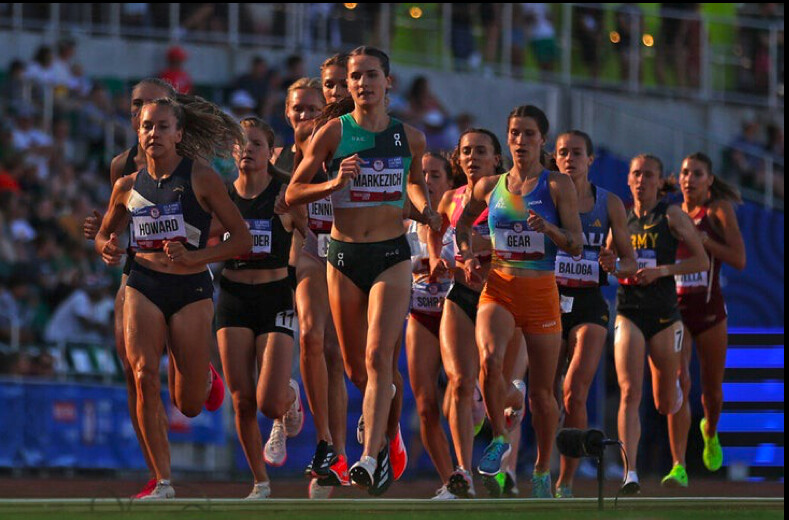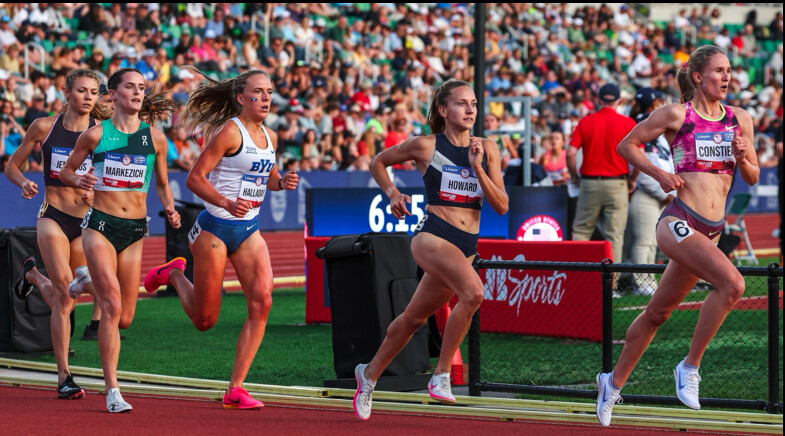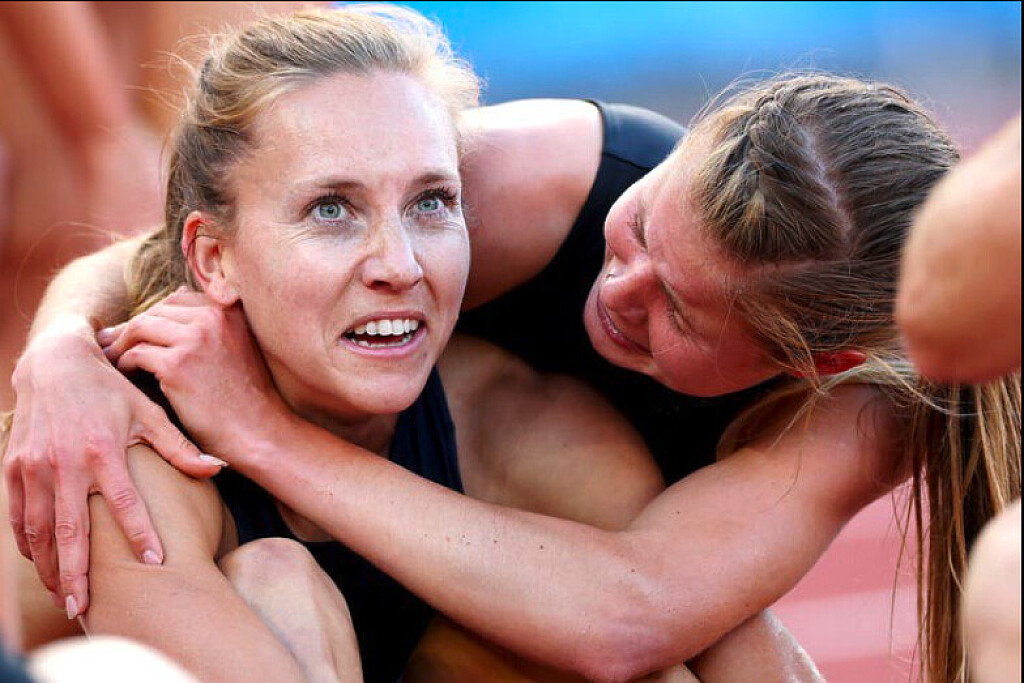Running News Daily
Running News Daily is edited by Bob Anderson. Send your news items to bob@mybestruns.com Advertising opportunities available. Train the Kenyan Way at KATA Kenya and Portugal owned and operated by Bob Anderson. Be sure to catch our movie A Long Run the movie KATA Running Camps and KATA Potato Farms - 31 now open in Kenya! https://kata.ke/
Index to Daily Posts · Sign Up For Updates · Run The World Feed
This 31-Year-Old Runner Is a Mom and an Olympian
Buoyed by her faith, motherhood, and family, Marisa Howard never relinquished her dream of becoming an Olympian
As a young girl, Marisa Howard dreamed about becoming an Olympian one day. But her focus was on another Olympic sport, gymnastics. She had no idea what the 3,000-meter steeplechase even was.


She also had no idea she’d be a mom when the dream actually came true.
Over the last two decades, Marisa, 31, has gone through numerous highs and lows, near-misses, injuries, a lack of sponsor support, and joyful life changes—most notably giving birth to son, Kai, in 2022. But the steeplechaser from Boise, Idaho, never let go of the dream. Relying on her faith, a strong family support system, and the frugal but full life she shares with her husband, Jeff, the dream came true on June 27 with a third-place finish in the steeplechase at the U.S. Olympic Trials in Eugene, Oregon.
After chipping away at her craft for three Olympic cycles, Marisa ran the race of her life—finishing with a 15-second personal best of 9 minutes and 7.14 seconds—to earn a spot on Team USA.
Her dream of running for Team USA in the Olympics officially materialized on August 4 when she lined up to race in the prelims of the 3,000-meter steeplechase in Paris. She ran with the lead pack in her heat as long as she could, but with two laps to go she slid to seventh and finished in that position in 9:24.78, missing the chance to advance to the August 6 final by two places and about seven seconds.
“I think it just becomes a lot more real when you see people that have been kind of knocking on the door for years and finally break through. It’s like, ‘Wow, we’re human and we can do it.’ Dreams do come true,” Marisa said. “I was six or seven or eight years old when this Olympic dream was born, and I plan on competing until he’s that age, hopefully, to show him what it’s like to do hard things and chase your dreams. I think it’ll be cool in 10 years when I show Kai these videos and be able to tell him, “Look at what Mommy did when you were two.”
In between making the team in late June and arriving in Paris in late July, Marisa’s life returned to normal—as if being a mom with a 2-year-old is ever normal, or at least consistent, on a day-to-day basis. That month included rough bouts of stomach flu for her and her son, the continued day-to-day management of Kai with Jeff, juggling workouts with childcare help from family and friends, reestablishing normal sleep patterns for everyone, and of course, finalizing travel plans to get the family to Paris.
It all came with a humbling reminder of the perspective that has been the bedrock of Marisa’s postpartum revival as an athlete.
“The day after I qualified, we were driving back home to Idaho and we were all tired. Kai was exhausted and screaming in the car, and I told my husband, ‘He doesn’t care that I’m an Olympian, he just wants food and sleep and, really, I’m just mom,’” she said. “It’s humbling—there’s nothing more humbling than taking care of your sick baby—and I think as a parent, we’re humbled every single day, and we come up short sometimes despite doing the best we can, but I’m thankful that there’s grace and forgiveness. I think it makes those high moments so much sweeter.”
Marisa is part of a new wave of elite runners that aren’t putting their family plans on hold due to their career, and one of several moms who competed at the U.S. Olympic Trials. Stephanie Bruce raced the 10,000 meters just nine months postpartum after giving birth to her daughter, Sophia, in September 2023, while Kate Grace ran strong preliminary and semifinal 800-meter races to advance to the final of that event just 15 months after giving birth to son, River, in March 2023.
Elle St. Pierre gave birth to her son, Ivan, at about the same time, and returned to racing six months postpartum, finishing seventh in a speedy 4:24 at the Fifth Avenue Mile in New York City. That was just the beginning for St. Pierre, who broke the American indoor record in the mile (4:16.41) in January then won the gold medal in the 3,000 meters at the indoor world championships in Glasgow in March. At the Olympic Trials, Pierre won the 5,000 meters and placed third in the 1500, qualifying for Team USA in both events, even though she declined the Olympic entry for the 5,000.
After Howard gave birth to Kai in late May 2022, she began doing pelvic floor therapy along with general strength training and some easy jogging. By the time she started running in earnest that fall, she was surprised at how quickly her aerobic fitness came back to her.
“What’s really surprised me is that I’m able to run paces that I never hit before pregnancy with the same amount or less effort,” she says. “My aerobic engine has just gotten so strong. You do see women come back stronger, but it’s a wide range of how long it takes them to come back. ”
When she returned to the track, she was aiming for a top-three finish at the 2023 U.S. championships to qualify for the world championships in Budapest. She made it to the final and was in third place with two laps to go, but just didn’t have the closing speed. However, she did get the Olympic Trials standard by clocking a near-PR of 9:22.73, demonstrating she was just as fast as her pre-pregnancy self despite limited training and two years away from racing.
By late 2023 and early 2024, Pat McCurry, Marisa’s coach since college, was able to add more volume and intensity to her training, setting up what he thought would be her best season yet. And while Marisa admittedly didn’t race as well as hoped in her races before the Olympic Trials, McCurry knew she was capable of great things.
“She was on a different level once we got back to that base fitness post-pregnancy, and I think that’s what’s paid off in massive fitness dividends,” said McCurry, who has coached Marisa on Idaho Afoot training group since 2015. “The racing didn’t look amazing from the outside. The training was spectacular. We were doing things in training since January that we’ve never done before—just the level of intensity and volume we were sustaining was stellar.”
Marisa picked up running at Pasco High School in Washington, and carried on with the dream at Boise State University. There, she also met Jeff Howard, a Boise State runner who held the school record in the 10,000 meters. But more important than their common athletic passion, they shared the same Christian values that were the foundation of her life. They married in the summer of 2013 just after he graduated. He eventually took a job as a high school teacher at a nearby school, while she blossomed into a three-time NCAA Division I All-American for the Broncos, notching a runner-up finish at the 2014 NCAA championships and fourth-place finish the following year as a senior.
After she graduated, she picked up a small sponsorship deal with women’s apparel brand Oiselle and set her sights on the 2016 U.S. Olympic Trials . She got injured and missed the trials that year. But Howard and her husband bought a house in Boise and started their family life in earnest. That added stability, along with the guidance of McCurry, who she began working with in 2016, allowed her to dig deeper into training and continue to make progress in the steeplechase, lowering her personal best to 9:30.92 at a race in Lapinlahti, Finland.
The Oiselle sponsorship evaporated after about three years but that didn’t seem to matter. She and Jeff were living frugally and loving life, especially because, by then, most of their family had moved to Boise. Marisa had two aunts who had lived in the area before she went to college, and Jeff’s parents moved to town shortly after they were married. Marisa’s parents, and later her best friend, Marianne Green, also picked up their roots and relocated to town.
The ensuing years brought a variety of highs and lows—several near-miss fifth place finishes at U.S. championships, a silver medal at the 2019 Pan American Games, a few injuries that delayed her progress, a breakthrough eight-second PR in the semifinals of the 2020 Olympic Trials, and, of course, welcoming Kai into the world in 2022.
What makes Marisa’s situation especially challenging is that she’s run competitively without a traditional sponsor since 2017, more or less collectively bootstrapping the dream on her husband’s high school teacher’s salary and working part-time as a schol nurse and as a coach. (She will officially join the Boise State staff as an assistant coach after the Olympics.) She often stays with friends when she travels to races and says she’s grateful to the meet directors who have flown her out to race, put her up in hotels, and also paid her to pace races.
She also earned USATF Foundation grants and in 2022 was the recipient of a $10,000 grant to offset child care expenses from a program sprinting legend Allyson Felix organized through Athleta’s Power of She Fund and the Women’s Sports Foundation. Marisa competed at the 2024 Olympic Trials as part of the Tracksmith Amateur Support Program, which provides a small quarterly stipend, running apparel, and shoes to about 40 athletes in all disciplines of track and field.
“We’ve found ways to make it work. We drive used cars, and we refinanced in 2020, so thankfully our mortgage is very low,” she says. “So really a lot of my expenses are just shoes, a little bit of travel, coaching fees, gym fees, and things like that. But it does add up. But thankfully we live well within our means and are able to do it. As I’ve said before, the Lord always provides.”
But even with that support and her continued progress, Marisa entered the Olympic Trials as a dark horse contender to make Team USA. And that’s despite knowing that Emma Coburn and Courtney Frerichs, the top stars of the event for the past 10 years, were sidelined with injuries. She hadn’t run great in her races leading up to the trials, and her confidence was waning, McCurry says.
“I felt like not having a full contract [from a shoe sponsorship] had kind of eroded away at some of her confidence, and she was starting to have a little bit of imposter syndrome at races,” says McCurry. “We just had a really firm talk where I was like, damn it, you’re better than this,” he says. “Not we, not the training, you, Marissa Howard, are better than this.”
That pep talk was just what she needed. It helped remind Marisa about her bigger purpose, just as much as packing diapers, toys, and pajamas for Kai did before she and Jeff made the eight-hour drive to Eugene for the Olympic Trials.
In her semi-final heat at the trials on June 24, Marisa ran aggressively and finished second behind Gabbi Jennings in 9:26.38. After the race, she said she was looking forward to the final, but, for the moment, was most interested in making sure Kai got to bed on time.
Running with purpose and caring for her son emboldened her for the final, where she ran with conviction among the top five before moving into the lead briefly with a lap to go. In what was a thrilling final lap, Val Constien retook the lead and sprinted to victory down the homestretch in an Olympic Trials-record 9:03.22, followed by a surging Courtney Wayment (9:06.50) and a determined Marisa (9:07.14) as the top nine finishers all set new personal bests.
“My husband and I talk about competitive greatness: You want to rise to the occasion when everyone else is at their best. So it’s like, gosh, I was able to do it! I think a lot of it for me has always been about having my priorities in place. I’m a Christian first, and then a wife, and then a mom, and then a runner. And I think if I keep those in that line, that’s where I see success,” Marisa says.
“I’ve sat next to gold medalists and other high-level athletes in chapels before U.S. championship races and they’ve told me, ‘I’ve won that gold medal and it doesn’t fill that void in my heart.’ And just knowing that a medal or success isn’t going to change you, ultimately, you have to be secure in who you are. So just remembering where my priorities lie helps to kind of keep me grounded.”
Login to leave a comment




